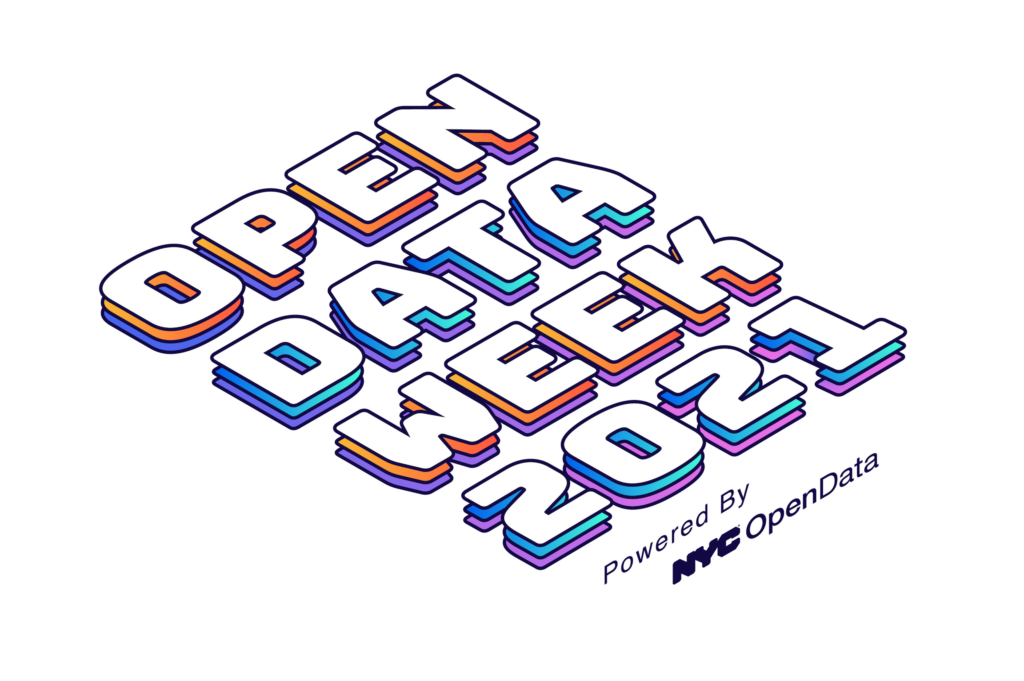At DataKind, we love NYC Open Data Week! It’s a unique opportunity for us to reconnect with our community, partners, and friends. And given that we just wrapped our first virtual DataDive® event of 2021 with the theme of Trust, Transparency, Together: Powering Public Data for Communities, we were excited to continue the open data conversation.
We hosted not one but three sessions where we discussed using open data in the context of community healthcare, data ethics, and project scoping. With over 200 attendees across all three sessions, we were thrilled to bring together individuals and partners from diverse backgrounds and have both discussion-based panels and informative presentations.
NYC Open Data Week is a week-long festival of community-driven events organized and produced by the NYC Mayor’s Office of Data Analytics and BetaNYC. This year, from March 6-14, 2021, there were 100+ event organizers that hosted virtual sessions to engage with people about open data, technology, and design.
Couldn’t make it to our sessions? Check out the summaries and recordings below!
Open Data & Ethics: A Case Study from DataKind & New America’s Future of Land and Housing Program
- Benjamin Kinsella, Technical Project Manager, DataKind (Moderator)
- Nathan Poland, Innovation Fellow, The Rockefeller Foundation
- Timothy Robustelli, Policy Analyst, New America’s Future of Land and Housing Program
- Mallory Sheff, Portfolio Manager, DataKind
- Emily Yelverton, Technical Lead, DataKind
Open data projects offer freedom and transparency for researchers, data scientists, subject matter experts, and critical stakeholders in the design and execution of social impact projects. However, despite enabling social actors to make more informed decisions and create new forms of social mobilization, there remain a number of ethical considerations that must be taken into account. In a recent partnership between DataKind, The Rockefeller Foundation, and New America’s Future of Land and Housing (FLH) Program, the team sought to explore – and understand – the state of eviction and mortgage foreclosure data in the US, and how local governments and organizations might be best supported to use data to help reduce housing instability. In this session, a panel of experts guided audience members in identifying and reviewing frameworks to explore ethical considerations in open data. As civic tech tools are developed and designed, we discussed data ethics that centers the human behind the data and explored how technologists and social actors can minimize harm and be more transparent and accountable in their actions.
Using Open Data & Algorithms to Motivate Equitable Community Healthcare: Lessons Learned & Application to COVID-19 Response
- Caitlin Augustin, Senior Director, Product, DataKind (Moderator)
- Asif Akram, Chief Technology Officer, Living Goods
- Brian DeRenzi, Director of Global Research Strategy, Dimagi
- Helen Olsen, Senior Research Program Manager, Monitoring and Data Systems, Medic
- Seema Parmar, Coalition Lead, CONVINCE
- Jeb Weisman, Director of Global Health Informatics, Icahn School Medicine at Mount Sinai
While increasing amounts of open, public, and digital data have the potential to transform health and healthcare response, the systems that have generated these large volumes of data are deeply and historically unequal. In the field of digital health, actors from the local (e.g. NYC Health Data) to global (e.g. the World Health Organization’s Commission on Social Determinants of Health) have worked to identify health disparities. Organizations working at the intersection of data science and community health must take a multifaceted approach that balances health domain and data science expertise to create tools and systems that motivate the use of health equity data and create algorithms that directly fight the inequalities presented. In this session, DataKind and partners showcased the analytical frameworks and data science solutions they’ve created to support health equity practices in community health, and discuss how those solutions have been applied during the COVID-19 pandemic.
How to Design & Execute a Data for Good Project Using Open Data: An Introduction to DataKind’s Scoping Approach
- Rachel Wells, Senior Manager, Center of Excellence, DataKind
- Benjamin Kinsella, Technical Project Manager, DataKind
The increased access to open data has presented new opportunities for better decision making and the potential to create greater social impact. However, the availability of raw data isn’t enough to catalyze change on its own. Figuring out how to use that data – that is, defining the problem statement that you’re trying to solve – is what we consider to be the most challenging part of executing a Data for Good project. In this session, we provided an overview of DataKind’s scoping process and case examples of how problem statements can be identified, evaluated, and executed. We covered best practices in Data for Good project work to understand how open data could be leveraged within a data science scoping framework. We also included how-to-guides and other resources within the DataKind Playbook, which will be a globally accessible living knowledge base that’ll provide standards and processes for Data for Good projects. These resources and information are useful for anyone who uses open data in decision-making, including data scientists, technologists, and social actors.
Image above courtesy of NYC Open Data Week.
Quick Links
- Powering Public Data for Communities: Highlights from DataKind’s Virtual DataDive️ Event
- Powering Public Data for Communities: DataKind Hosts Virtual DataDive Event
- Interested in sponsoring a DataKind event? Partner with us.
- Interested in supporting our work? Donate here.
- Have you signed up to volunteer with DataKind yet? Look no further.
- About DataDive events



